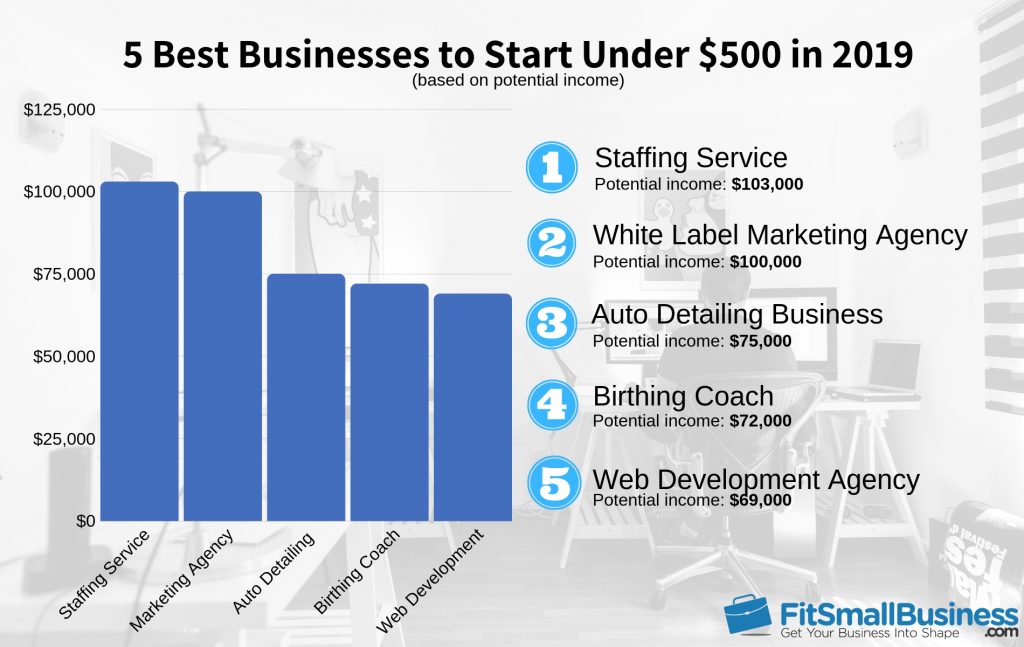Let’s be honest: Who doesn’t dream of running a business, calling all the shots, and raking in the profits?
Fortunately, the affordability of digital tools is making it cheaper—and easier—than ever for entrepreneurs to start a profitable business. Anyone can start a website for a few dollars, and readily available marketing, communications, and graphic design tools means would-be entrepreneurs have ready access to most of what they need to launch a startup. It’s no surprise, then, that this has resulted in a boom in entrepreneurship.
In fact, in 2017, there were half a million new entrepreneurs entering the market every month nationwide, according to the Kauffman Index. This is a 25% increase from 2009, as reported by the Chamber of Commerce. Of those new businesses, more than 60% are home-based businesses, according to the SBE Council—in part due to the abundance of digital tools accessible from home.
This got us thinking: Which types of businesses can be started with minimal upfront cost? And of those businesses, which would likely make entrepreneurs the most money? To find the answers, we researched businesses that require an upfront cost of $500 or less, do not require an advanced degree or extensive experience, have proven income potential in an existing market, can be started anywhere in the country, have the potential to generate profits year-round, and can be launched in three months or less.
Here are the weighted metrics we used to compile our definitive ranking:
- Cost (20%): To qualify for our list, a business must have a minimum viable product and cost $500 or less to launch. This upfront cost includes a business’ investment in materials, tools, and labor, a website (with a minimum year-long plan), marketing, and other related costs required to begin sales of a product or service. Business registration fees are not included as the cost varies greatly from state to state; some states, such as Massachusetts, charge $500 to file for limited liability company (LLC) designation.
- Average income (20%): Additionally, each business has to have average earnings above the national average adjusted gross income of $35,000 (according to the IRS Statistics of Income). Average earnings by business type are not widely available, so we gauged income based on salary figures from leading job information sites like PayScale and Glassdoor.
- Opportunity (20%): Businesses that made our list do not require extensive training or an advanced (post-graduate) degrees. Additionally, they can be started in any state within three months and can be run full-time and year-round.
- Existing market size (20%): Businesses have to be in industries with existing markets; otherwise, they will require a higher-than-average amount of marketing to generate customers, and thus drastically reduce the possible return on initial investment. To determine existing market size, we pulled data on industry-wide revenue; each business we ranked exists within an industry boasting a minimum value (revenue) of $1 billion.
- Industry growth (20%): While industry growth is not necessarily indicative of an individual business’ success, it indicates the opportunity for success. For that reason, we sought businesses in industries with earnings-based growth rates above the historical average year-over-year growth rate of 2.5%.

Five best businesses to start under $500 in 2019
Below is our list of the top 15 businesses to start for under $500 (ranked by income potential):
1. Staffing Service
Average annual income: $103,000
Minimum upfront cost: $150 to $200

Best business to start under $500: Staffing Service
Staffing service businesses, which connect employers to qualified personnel, lands at number 1 on our list because it has an average six-figure salary hovering at $103,000 per year—98% above the national average income. Little wonder it’s so high; the global staffing industry is valued at $466 billion, according to Staffing Industry Analysts. It also forecasts a 6% industry growth rate (140% above the average industry growth rate of 2.5%) for 2019.
Staffing service companies are also very affordable to start. Nowadays, job postings, resume submission, interviews, and hiring can all be done virtually, eliminating the expense of commercial space. A website will be necessary, though this can be built and launched quickly and inexpensively using a drag-and-drop website builder, which costs around $12 per month. If you’re genuinely interested in this avenue, consider a niche job site, such as staffing for international nannies or children’s summer camps, to differentiate yourself from other staffing agencies.
2. Marketing Agency That Uses White Label Services
Average annual income: $100,000
Minimum upfront cost: $300 to $350

Best business to start under $500: White Label Marketing Agency
Marketing agencies are all the rage these days—and are actually relatively easy to start. You don’t even need extensive experience in marketing. Instead, you can hire a white label marketing firm—which handles the work for you—and simply deliver the results to your clients. Sounds too good to be true? It isn’t. Agency owners at firms like these have an average income of around $100,000 and are part of the $192 billion digital advertising industry with a projected 7.7% industry growth rate, according to Digita Global.
Another benefit: Because you’re hiring white label experts to handle your workload, there are no upfront staffing costs. Also, your agency can be run remotely and only requires a website, some basic marketing certifications—which you can easily get online—and good old-fashioned networking skills to get started. These white label marketing agencies typically offer services such as paid search, social media marketing, and search engine optimization services.
3. Auto Detailing Business
Average annual income: $75,000
Minimum upfront cost: $35 to $400

Best business to start under $500: Auto Detailing Business
It’s expensive to have a vehicle detailed, but you may be surprised to learn that the average income of an auto detailing business is around $75,000 per year, according to Chron. It is part of the $78 billion cleaning industry that has a projected 6% industry growth rate from 2014 through 2020, according to CleanLink. The growth may be in part due to the boom of the ridesharing economy; after all, keeping a clean car is important for rideshare drivers.
If you have a penchant for detail and enjoy a bit of physical labor, this could be a good business idea for you. It can be very inexpensive to start, requiring basic cleaning tools and supplies, a website, and a bit of marketing—which can be done with free listing directories, such as Google My Business, and social media such as Facebook. Many new auto detailing businesses pick up client vehicles and clean them at their home to avoid the expense of renting commercial space.
4. Birthing Coach
Average annual income: $72,000
Minimum upfront cost: $300 to $350

Best business to start under $500: Birthing Coach Business
A birthing coach, also known as a doula, is a non-medical labor assistant who helps comfort and support the mother during and after childbirth. Though it’s not a one-size-fits-all business idea, it’s a unique business for those who are compassionate about helping others and have experience with childbirth and caring for newborns. It has an average income of $72,800, according to the International Doula Institute, and is part of a $23 billion baby industry, according to MarketWatch.
Starting a doula business does not require a Ph.D. or years of experience in a hospital delivery room. It also does not require a large sum of money. You just need to familiarize yourself with the role of a doula, which can be done through online educational courses such as the Doula Business Owner Certification from IAP Career College for just $77. It will also require a basic website and depend on securing business through your professional network and referrals.
5. Web Design Agency
Average annual income: $69,000
Minimum upfront cost: $150 to $200

Best business to start under $500: Web Design Agency
Every business needs an online presence with a professional website, and though there are many platforms available to give individuals an easy way of building their own site, many still choose to hire a web designer. The average income of web developers is $69,430, according to The Bureau of Labor Statistics, illustrating the potential revenue for moderately-tech-savvy entrepreneurs who want to launch their own company. It’s part of a $38.3 billion market in the U.S. with a projected growth rate of 6% in 2019, according to IBIS.
While you should have basic web design knowledge to take this entrepreneurial path, you don’t have to have a computer science degree or be an experienced developer. These days, it’s possible to build websites without code on WordPress, as well as with drag-and-drop website builders like Wix and Weebly. It’s also possible to outsource the work to pros. To get started, you will need a website of your own (for marketing), business listings in online directories such as Upwork and Fiverr, and promotion of your services to your local network.
6. Shipping & Logistics Company
Average annual income: $64,000
Minimum upfront cost: $250 to $300

Best business to start under $500: Shipping and Logistics Business
Shipping and logistics is not a career path you’ve probably considered. But it’s happening all around you; the shipping industry handles everything from temperature-sensitive meat and produce to antique barns and zoo animals. Behind every product is a logistics and shipping company—and the outsized demand means good pay. In fact, the average salary for a logistics manager is $64,182 per year, according to PayScale. Plus, thanks to booming ecommerce, it’s a rapidly growing industry.
Those interested should have some experience in the industry and have a strong grasp of logistics and analysis in general. What you won’t need is a costly fleet or massive warehouse space. Instead, it’s possible to start for under $500 by subcontracting drivers who own their own vehicles. To be successful, you will need to acquire contracts with businesses that frequently ship products, such as auction houses or regional or national ecommerce sites.
7. House Painting Business
Average annual income: $60,000
Minimum upfront cost: $400 to $500

Best business to start under $500: House Painting Business
If you’re looking for a revolutionary business idea, house paint isn’t it. However, it is a tried-and-true business that has held its ground for decades and kept many a painter well employed; the average salary is just under $60,000 per year, according to PayScale. It’s a part of the $383.3 billion home improvement industry, according to HomeAdvisor—an industry with a projected 3.85% annual growth rate, according to Chron.
Starting a home painting business doesn’t cost a fortune, either. You should have some painting and home improvement experience, a website, a knack for networking, a commitment to marketing yourself, and some basic materials, such as paint, brushes, tape, and ladders. You can purchase additional materials as needed to accommodate each client’s unique painting needs.
8. Property Management Company
Average annual income: $57,000
Minimum upfront cost: $150 to $200

Best business to start under $500: Property Management Business
The growth of the sharing economy in the property space, as evidenced by the boom of companies like Airbnb, has given way to a new world of property management. Once upon a time, homeowners with multiple properties were burdened with the maintenance of more than one house. Now, homeowners are seeking property managers to help them manage their second homes, which they have converted to Airbnb vacation rentals. The average salary of property managers is $57,628, according to Salary.com, though these figures are likely higher as vacation rental property managers often get a commission on bookings.
So what does property management entail? In short, property managers manage all service providers, such as house cleaners, gardeners and lawn care, plumbers and electrical service providers, as well as facilitate check-ins and check-outs. They also manage rentals through the Airbnb booking platform. To get started, you will need to build a website and market your business online. While marketing can be expensive, it can also be affordable; consider leveraging listings in free directories, social media, and direct outreach to Airbnb owners.
9. Life & Business Coaching
Average annual income: $51,000
Minimum upfront cost: $220 to $270

Best business to start under $500: Life Coaching Business
If you’re the type of person friends and family always come to when they have an issue, you may be a great fit for starting a life coaching business. Coaches are similar to mental health counselors, though no formal education is required and the job does not involve in-office visits. The average salary of a life coach is around $51,000, according to the Universal Coach Institute. It’s considered part of the $9.9 billion personal development industry that has a projected yearly growth rate of 6.7% from 2016 to 2022, according to Market Research.
So what does it take to start a life coaching business? Life coach certifications are available for as little as $70 through online programs such as ExpertRating, though certification is not required. You will, however, need to build a website and list your business on life coaching directories such as Coach.me and Noomii. Networking, like with most businesses, will be key, so get involved in your local community—as well as online communities—and attend relevant events, such as personal development seminars, to meet those interested in self-improvement.
10. Event Planning Business
Average annual income: $50,000
Minimum upfront cost: $200 to $250

Best business to start under $500: Event Planning Business
Events are big to-dos, whether people are saying their “I do’s,” celebrating a birthday, launching a new product, or team building on a company retreat. There are all types of events out there, and event planning companies are being hired to design them, soup to nuts. The average salary of an event planner is just under $50,000, according to Chron, and the profession is expected to grow 10% from 2016 to 2026, according to The Bureau of Labor Statistics. With our love of celebration, it’s no wonder event planning is currently a $4 billion industry, according to Socialtables.
Starting an event planning business is considered very affordable. To avoid the expense of a high-ticket commercial space, work remotely and go to your clients. The business will need a website, ideally with work samples. When you’re just starting out, these can be obtained by offering free event planning services in order to attract your first clients. Marketing efforts will be key to gaining awareness, so list your business on event sites such as WeddingWire and Meetingpages. Those in a niche might want to try using paid search on Google to get discovered.
11. Web Hosting Business
Average annual income: $48,000
Minimum upfront cost: $300 to $400

Best business to start under $500: Web Hosting Company
Owning a web hosting company sounds expensive and technical. However, with reseller hosting and server leasing, it’s actually a low-cost business that doesn’t require a degree from MIT or decades of experience. It has a mid-range income of around $48,000, but for many, it is a six-figure income, according to Lifewire. The web hosting services market is expected to grow tremendously, with a projected compound annual growth rate of 16% between 2016 and 2022, according to MarketWatch.
To get started, all you need is a reseller hosting plan. All of the leading web hosting companies offer reseller programs, where businesses can sell their hosting plans to clients directly—many under a white label. Consider a reseller hosting plan for around $25 per month to start, then implement a marketing plan to start drawing in clients.
12. Education & College Prep Services
Average annual income: $45,000
Minimum upfront cost: $175 to -$200 (not including the cost of a degree)

Best business to start under $500: Education and College Prep Services
College preparation services help teens get set up for admissions success with standardized test prep, class tutoring, and college advising. The average salary of a tutor is $45,600, according to Recruiter. However, many tutors make between $70,000 and $120,000, and there are tutors making over $1 million per year, according to CNBC. It’s also not going anywhere; the industry is expected to grow 12.75% from 2017 to 2021, according to The Journal.
While there are no official credentials involved, top tutors typically hold degrees from recognized and well-regarded colleges and universities. After all, if you haven’t gone to college, you won’t likely have a great grasp on the admission and standardized testing processes involved in getting into college. With a formal degree and an aptitude for teaching in place, you will need to promote your business with a website and build awareness through networking and digital advertising.
13. Commercial Photography Business
Average annual income: $44,000
Minimum upfront cost: $400 to $450

Best business to start under $500: Commercial Photography
Starting a photography business may be more feasible, and affordable than you thought. If you have a knack for art and an eye for taking photos, you may want to consider starting a commercial photography business. The average salary of a photographer is $44,219, according to PayScale. And photography is a growing business—especially in the age of digital and social media—with a 6.1% growth rate between 2016 and 2021, according to Zion Market Research.
The cost to start a professional photography business has traditionally included the cost of expensive equipment—typically a few thousand dollars. Now, equipment has not only become much less expensive, but it’s also possible to rent photography equipment at reasonable prices. There’s also no need for an arts degree; the abundance of educational resources on YouTube, Udemy, Coursera, Creative Live, and other online platforms means you can get professional instruction on photography for under $100.
14. Mobile Beauty Services
Average annual income: $41,000
Minimum upfront cost: $475 to $500

Best business to start under $500: Mobile Beauty Services
Ditch the salon and take to the road with a mobile beauty services business, such as a mobile blow-dry service. The average salon owner makers in the U.S. makes around $41,000 per year according to the Bureau of Labor Statistics—but that’s after a heap of overhead. Going mobile eliminates the expense of renting commercial space and buying costly equipment, giving you room for a larger piece of the $211.1 billion industry that is growing at a healthy rate of 3.1% compound annual growth rate (CAGR), according to Grand View Research.
A huge trend in the beauty industry is blow-dry-only services. According to Forbes, salons like Drybar, a franchise worth $100 million, are cropping up that offer only this service. Unlike traditional salon services, you do not have to be licensed to wash and blow-dry hair, so expensive schooling is not required. Plus, by taking the business on the road, you provide a convenient service to your clients and diminish the costs generally associated with salons. There are even cheap ways to process payments on-the-go with a mobile point of sale (POS) system.
15. Travel & Tourism Agency
Average annual income: $40,000
Minimum upfront cost: $400 to $450

Best business to start under $500: Travel and Tourism Agency
The world seems to be getting smaller as travel becomes more accessible and affordable, and while many choose to take matters into their own hands and book their own trips, others still opt for professional assistance from travel agencies. The average salary of a travel agent is a respectable $40,840 per year, according to Forbes, though the $5.29 trillion industry does see travel agency owners making millions, according to TravelWeek.
The least expensive way to break into the industry as a travel agency is by acting as a third-party sales company for big name travel companies such as Carnival Cruises and Royal Caribbean. This means you could sell cruise packages to your clients and make a commission off your sales without any overhead. To start, you will need to team up with a provider, such as Cruise Inc., for whom you can become an affiliate; get an ecommerce website where visitors can book your packages; acquire a travel planner certification; and most importantly, market your business in order to attract customers.
Methodology
We based the ranking of the 15 best businesses to start for under $500 on six overarching categories comprised of 14 metrics in total. We then weighted each metric based on its relative importance.
Our ranking considered the following factors:
Cost: 20%
In order to qualify for our list, each business must incur launch costs of no more than $500. This included all necessary upfront costs required to launch a business, such as tools and equipment, educational costs, required licensing, labor, a website (with a minimum year-long plan), and marketing. The cost does not factor in the fees to register a business, as these vary greatly from state to state, and some states, such as Massachusetts, charge $500 to file for an LLC alone.
Average Income: 20%
Each business idea considered had to have an average income above the national average adjusted gross income of $35,000 (according to the IRS Statistics of Income). Average income can be found on sites like PayScale and Glassdoor, and while these are largely reflective of employee salaries and earnings, they serve as indicators of likely profit for new business owners. When available, average income for the business itself was used in lieu of average employee salaries.
Opportunity: 20%
For businesses to qualify for our list, there had to be minimal prerequisites for launching them. To ensure this, each business we ranked requires no more than a bachelor’s degree or a few years of experience in the field; each can legally be started in any state in the U.S. and is not location-specific; and each one has the opportunity to be run as a full-time, year-round business. This weeds out business ideas that are too specialized and therefore exclusive, as well as ideas that are run as side gigs.
Existing Market Size: 20%
Businesses must be in industries with large existing markets. The reason for this is because innovative and experimental businesses ideas typically require extensive marketing efforts in order to gain product knowledge and awareness, making it unlikely to be started for $500 or less. To measure market size, we looked at the value of each industry; to make our list, the business had to be in an industry with revenues of at least $1 billion.
Industry Growth: 20%
To avoid gimmicky and fad-type business ideas, we considered industry growth as an indicator of future profitability and business longevity. We sought businesses in industries with average growth rates above the average year-over-year business growth rates of 2.5%.
Bottom Line: Best Business Ideas Under $500
Technology may be best known for making people’s lives easier, but as technology becomes more affordable and accessible, it also makes it cheaper than ever to start a business. That’s why we sought out businesses you can start in 2019 for $500 or less. To do so, we considered profitability based on average income and earnings, market size, and market growth. What we found was somewhat surprising—but definitely inspiring. Peruse our top 15 jobs above and get started on your dream career today with minimal upfront cost.
Read More
0 تعليقات